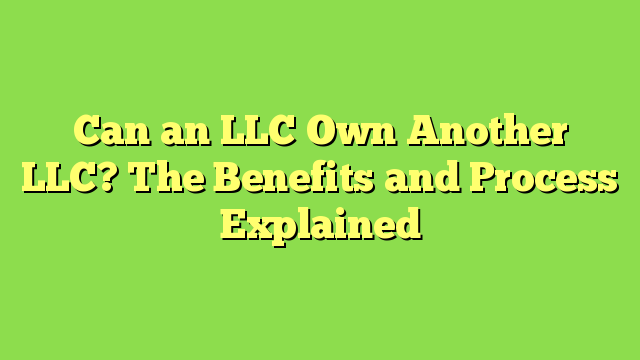As a business owner or investor, protecting your assets and limiting liability is crucial. One strategy to achieve this is to structure your business using multiple limited liability companies (LLCs).
But can an LLC actually own another LLC? The simple answer is yes – and there are some compelling reasons why you may want to consider this approach.
What is an LLC?
Before we dive into whether an LLC can own another LLC, let’s quickly review what an LLC is. A limited liability company is a business structure that combines aspects of corporations and partnerships. Some key benefits of an LLC include:
- Limited liability protection for owners/members
- Pass-through taxation (no double taxation)
- Flexible management and operating structures
LLCs have become an increasingly popular choice for businesses of all sizes and across industries due to these advantages.
The Benefits of an LLC Owning Another LLC
There are several important advantages to having one LLC own a subsidiary or multiple subsidiary LLCs:
Asset Protection and Limited Liability
The primary benefit is enhanced asset protection and liability limitation. If one of your subsidiary LLCs faces a lawsuit or bankruptcy, the creditors can only pursue the assets within that specific LLC. Your other business assets and personal assets held under separate LLCs are protected.
For example, let’s say you own rental properties through multiple LLCs under a master/parent LLC. If a tenant suffers an injury at one property and sues, only the LLC that owned that specific rental property would be liable – not your other rental property LLCs or personal assets.
Operational Flexibility
Another key advantage is increased operational flexibility and growth potential. By having separate LLCs for different business lines or investments under one parent LLC, you can more easily expand into new areas with the appropriate subsidiary LLC without risking your entire operation.
Simplified Administration
Depending on the structure used, having subsidiary LLCs owned by a parent can also streamline administration and tax filing requirements compared to operating numerous completely separate LLCs.
How to Structure LLC Ownership of Another LLC
Structuring an LLC ownership of another LLC is quite a straightforward process that can be followed by a few different approaches:
Parent-Subsidiary Structure
The most common approach is to establish a parent or holding company LLC that then owns controlling interests in one or more subsidiary LLCs. The parent LLC conducts oversight and administration, while each subsidiary operates a distinct business line, investment, or asset.
Series LLC
Some states allow for a series LLC, which is a master LLC with subdivisions or “cells” that have separateness similar to subsidiary LLCs but with easier formation and administration. Series LLCs are currently allowed in states like Delaware, Illinois, Iowa, and around 15 others.
Tax Considerations for LLC Subsidiary Ownership
From a tax perspective, having a parent LLC that owns subsidiary LLCs is relatively simple and easy:
- Each subsidiary LLC is typically a single-member LLC that is a disregarded entity for tax purposes
- The subsidiary LLCs’ profits and losses pass through to the parent LLC
- The parent LLC pays taxes on the combined profits at the LLC level based on its chosen tax status (e.g. partnership or corporation)
So in most cases, you would only need to file one tax return for the parent LLC covering all underlying LLCs. However, consulting a CPA or tax advisor is highly recommended to ensure full compliance.
LLC Formation and Compliance Requirements
If you want one LLC to own another, you’ll need to properly form and maintain both the parent and each subsidiary LLC. Requirements include:
- Filing Articles of Organization in the state(s) the LLCs will operate
- Drafting an LLC Operating Agreement for each LLC
- Obtaining any required licenses and permits
- Opening separate bank accounts for each LLC
- Maintaining adequate records and funding for each LLC
- Filing annual reports/renewals in each state
So while an LLC owning another LLC provides great benefits, there are added formation and maintenance responsibilities. Working with an online LLC formation service and an experienced LLC lawyer is advisable.
Bottom Line: The Right LLC Structure for Your Business
In conclusion, LLCs can absolutely own interests in other LLCs through parent-subsidiary structures, series LLCs, or other approaches. This allows for tremendous flexibility in asset protection, growth, operations, and tax efficiency.
However, creating this type of multi-LLC structure requires careful planning and compliance – so it’s best to consult qualified legal and tax professionals. With the right LLC setup, you can confidently run and expand your business while limiting your exposure.

Alfie Wilson, Esq., is a legal content writer with expertise in business formation, criminal law, veterans disability, family law, DUI law, personal injury, animal welfare, and legal writing. He holds a J.D. from Emory University School of Law and has experience in appellate advocacy and regulatory matters. Alfie’s passion lies in breaking down complex legal topics for a non-lawyer audience. He currently writes for law firms and non-profits on various issues and resides in Arlington, Virginia.









